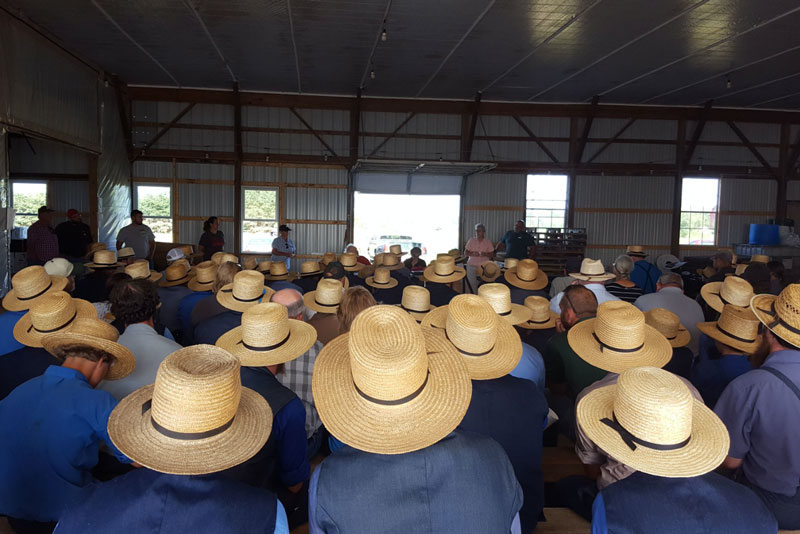Fresh produce is the leading cause of foodborne illnesses in the country, and Ohio growers must meet federal food safety standards to ensure that their produce is safe. Understanding regulatory requirements, awareness of safe agricultural practices, and developing and following written food safety plans (FSP) are critical steps toward minimizing the risk of on farm produce contamination.
The project took place from September 2017-September 2019 and consisted of a team of food safety state specialists, extension educators, food safety regulators and community organizations to provide a diverse group of Ohio growers with the tools and resources needed to supply consumers with a safe product. The project's specific goals were to:
- Ensure the sustainability of the fresh produce industry by improving the safety of fresh produce supplied by growers in Ohio, Kentucky and West Virginia through the development and implementation of fresh produce safety education
- Provide training opportunities
- Foster a fresh produce safety culture leading to farmer success in public health
Leading the project from Ohio State were Sanja Ilic, PhD, associate professor and food safety state specialist, Department of Human Sciences, College of Education and Human Ecology, and Melanie Lewis Ivey, PhD, assistant professor and fruit pathologist, Department of Plant Pathology, College of Food Agriculture and Environmental Sciences.
They were able to developed training for several marginalized groups of fresh produce growers in Ohio and beyond. Below are the final outcomes and materials created as a result of the project.
Working with extension educators from the Ohio State fruit and vegetable safety team a curriculum was developed for a food safety plan writing workshop. The curriculum includes an Educator Playbook that provides guidance for Educators to organize, implement and evaluate the workshop and a farm food safety template. The playbook includes a template for a workshop agenda and advertisement flyer, suggestions (i.e. talking points) for the educators on how to guide a grower through each section within the farm food safety template, and a list of common practices and unexpected growing conditions (i.e. flooding) that should be considered when completing the template. The roles of educators and participants and who the workshop should target are also stated in the playbook.
The food safety plan template was developed to meet the following criteria: 1) aligned with FSMA Fresh Produce Safety Rule requirements, 2) considers diverse growing practices, 3) terminology appropriate for a diverse group of growers and 4) suitable for completion on- or off-line (i.e. no technology needed to complete the template). Prior to developing the template food safety plan templates and development tools from other universities (i.e. Kansas State University and Penn State University) and agencies (i.e. Vermont Vegetable and Berry Growers Association and Carolina Farm Stewardship Association) were reviewed and evaluated for their usefulness for Ohio growers. The workshop was piloted December 2019 with Ohio State Outlying Branch managers.
In an effort to increase public awareness of fresh produce safety resources available at the Ohio State, the fruit and vegetable safety team website was redesigned. Funding from this grant as well as funding from OSU Extension and the Departments of Plant Pathology and Horticulture and Crop Sciences supported a program coordinator to maintain the website. The website is hosted through the College of Food, Agricultural and Environmental Sciences
website. The website includes fresh produce safety resources from other Ohio State groups (i.e. UrbanGems, Food Innovation Center) as well as outside groups (Ohio Department of Agriculture, Produce Safety Alliance, North Central Region Center for FSMA Training, Extension, and Technical Assistance).
The website was promoted at conferences, workshops, grower meetings and by the North Central Region Center for FSMA Training, Extension and Technical Assistance.
By leveraging support from this Connect and Collaborate grant and from the USDA-Agricultural Marketing Service, a Farmer’s Handbook for the USDA Harmonized GAP (HGAP) Standard was developed to assist small- and mid-scale growers in preparing to meet the requirements of the HGAP audit and thereby improve their opportunities to access markets for fruit and vegetables. Content for the handbook was prioritized based on results of a survey of over 100 farm operators who obtained a USDA HGAP audit in 2018. A manuscript of the survey results is in preparation. The handbook is free and can be downloaded from the Ohio State fruit and vegetable safety
website. The handbook is also available in hardcopy for growers with limited or no access to the internet.
Urban GEMS uses new food production technology to grow healthy foods while promoting healthy eating in urban neighborhoods that are characterized as food deserts. Urban GEMS has the overall goal to connect students to local food industry professionals and create youth advocates for a healthy food system. The food production is done through vertical aeroponic grow systems such as the Vertical Garden System. The implementation sites are at schools and community centers in economically distressed African American neighborhoods in Columbus, OH. These programs serve youth ages 10-17.
Observational studies were conducted by an undergraduate student and good agricultural practices were tailored for vertical garden systems. A training curriculum was developed and implemented at two Urban GEMS locations by the undergraduate student.
